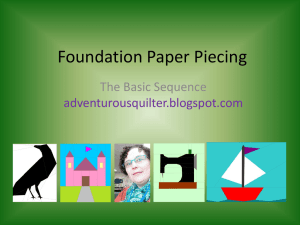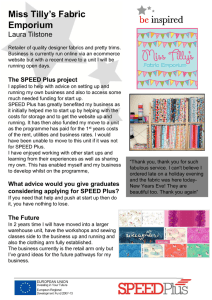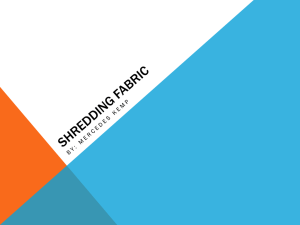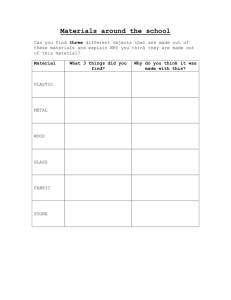white, and Blue Red - American Library Association
advertisement
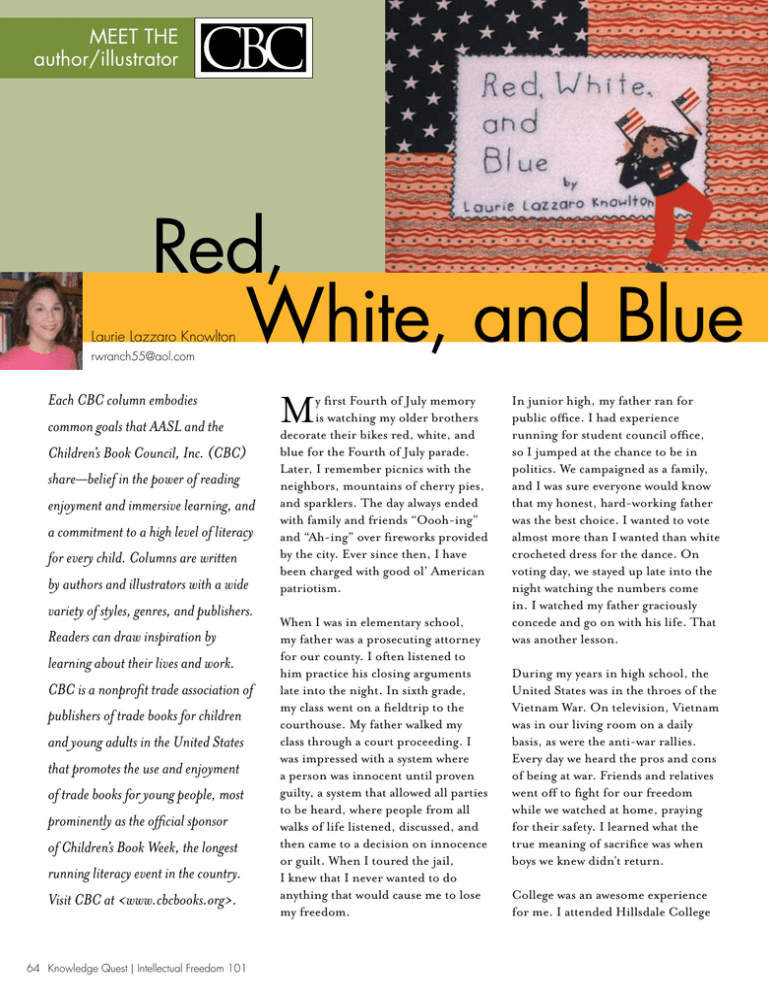
meet the author/illustrator Red, White, and Blue Laurie Lazzaro Knowlton rwranch55@aol.com Each CBC column embodies common goals that AASL and the Children’s Book Council, Inc. (CBC) share—belief in the power of reading enjoyment and immersive learning, and a commitment to a high level of literacy for every child. Columns are written by authors and illustrators with a wide variety of styles, genres, and publishers. Readers can draw inspiration by learning about their lives and work. CBC is a nonprofit trade association of publishers of trade books for children and young adults in the United States that promotes the use and enjoyment of trade books for young people, most prominently as the official sponsor of Children’s Book Week, the longest running literacy event in the country. Visit CBC at <www.cbcbooks.org>. 64 Knowledge Quest | Intellectual Freedom 101 M y first Fourth of July memory is watching my older brothers decorate their bikes red, white, and blue for the Fourth of July parade. Later, I remember picnics with the neighbors, mountains of cherry pies, and sparklers. The day always ended with family and friends “Oooh-ing” and “Ah-ing” over fireworks provided by the city. Ever since then, I have been charged with good ol’ American patriotism. When I was in elementary school, my father was a prosecuting attorney for our county. I often listened to him practice his closing arguments late into the night. In sixth grade, my class went on a fieldtrip to the courthouse. My father walked my class through a court proceeding. I was impressed with a system where a person was innocent until proven guilty, a system that allowed all parties to be heard, where people from all walks of life listened, discussed, and then came to a decision on innocence or guilt. When I toured the jail, I knew that I never wanted to do anything that would cause me to lose my freedom. In junior high, my father ran for public office. I had experience running for student council office, so I jumped at the chance to be in politics. We campaigned as a family, and I was sure everyone would know that my honest, hard-working father was the best choice. I wanted to vote almost more than I wanted than white crocheted dress for the dance. On voting day, we stayed up late into the night watching the numbers come in. I watched my father graciously concede and go on with his life. That was another lesson. During my years in high school, the United States was in the throes of the Vietnam War. On television, Vietnam was in our living room on a daily basis, as were the anti-war rallies. Every day we heard the pros and cons of being at war. Friends and relatives went off to fight for our freedom while we watched at home, praying for their safety. I learned what the true meaning of sacrifice was when boys we knew didn’t return. College was an awesome experience for me. I attended Hillsdale College in Michigan. I did the usual things college girls do: studied; played; met the love of my life, my husband, Tom; and learned how to become an elementary school teacher. I was blessed to have learned from an amazing teacher, Mrs. Gaberdiel. She had a passion for the presidents, especially Lincoln. Together we planned wonderful units teaching the children about their founding fathers, civil rights leaders, and the meaning of the Pledge of Allegiance. I carried on Mrs. Gaberdiel’s legacy in my classroom, expanding every year’s units to include Veteran’s day, Election Day, and Memorial Day. I began writing my first year of teaching. I did everything wrong. I didn’t read the how-to books, I didn’t attend conferences, I didn’t seek out other writers, and I sent my stories out, twenty at a time, bombarding every publisher in the market. I figured that I read to my students every day. How hard could writing a children’s book be? After many rejections, I began reading the how-tos, and was fortunate enough to attend a wonderful writer’s conference given by Highlights Magazine held in Chautauqua, New York. It was magical. I was able to talk with editors, writers, and illustrators. The Chautauqua environment was like something out of a storybook: beautiful Victorian homes, families strolling the grounds, and an American flag displayed on every porch. I couldn’t help myself. I photographed our glorious flag blowing, hanging, snapping, and celebrating. That was the seed for my book Red, White, and Blue (Pelican, 2002). Our flag, made of three colors, a few stripes, and a number of stars, stood for so much: our freedom to write our thoughts and have them published and read, our freedom to speak our minds, our freedom to receive an education, our freedom to worship or not, our freedom to meet together without fear. With every flag I saw I knew I had to put these feelings into words. When I finished the manuscript and illustration samples, I sent them to two publishers that I knew. They both turned the book down. I remember one of them saying, “No one is patriotic anymore.” That was just months before 9/11. I put the manuscript and art in a drawer and told myself, “See! What made you think you could be an artist? And of a patriotic book, of all things!” As the book began to come together, I realized that something we take for granted—fabric—had been used to tackle the enormous job of representing the sacrifices of the men and women who protect our freedoms. The essence of our flag was conveyed through simple fabric. As “fabric” states were added to our nation, a new constellation of stars formed. Thirteen fabric stripes remind us of those original thirteen states. Fabric composed of myriad threads, each thread represents thousands of individuals living in a country based on truth, freedom, equality, and happiness. We, the people, make up that fabric that we call the United States of America. Like so many people, I know exactly where I was and what I was doing on 9/11. I remember crying as I watched the news. All I held dear was threatened that day. We were bewildered, frightened, and angry, then, as the day went on, we witnessed courage, compassion, and fellowship. America stood united. It was not long after 9/11 that Pelican asked to publish Red, White, and Blue. The pictures and the words seemed to flow in unison. The book had to be made with fabric collage. No other medium would have encompassed the text and the feeling I wanted readers to take away when they closed my book. I hadn’t thought of myself as an artist since elementary school. Somewhere along the line I had lost my artistic confidence. So the fact that I wanted to write and illustrate this book felt a whole lot like standing naked and asking if the crowds of people saw any flaws. But for some reason, the book wouldn’t let me alone. We Americans are patriotic. We are the fabric that makes up this diverse nation. We are a nation that believes in our liberties. We are a nation that revels in its freedoms. We are united by the Red, White, and Blue! Laurie Lazzaro Knowlton is an Ohio native who lived in Houston for seven years. An elementary-school teacher for fifteen years, Laurie and her husband have since moved back to her childhood Ohio farm. The author of thirty-one books, Knowlton has been published in the trade, educational, craft, and Christian markets. Why Cowboys Sleep with Their Boots On (Pelican, 1995), Laurie’s best-selling picture book, won the Premier Print Award given by Eastman Kodak and has sold more than 40,000 copies since publication. Volume 36, No. 2 | November/December 2007 65
